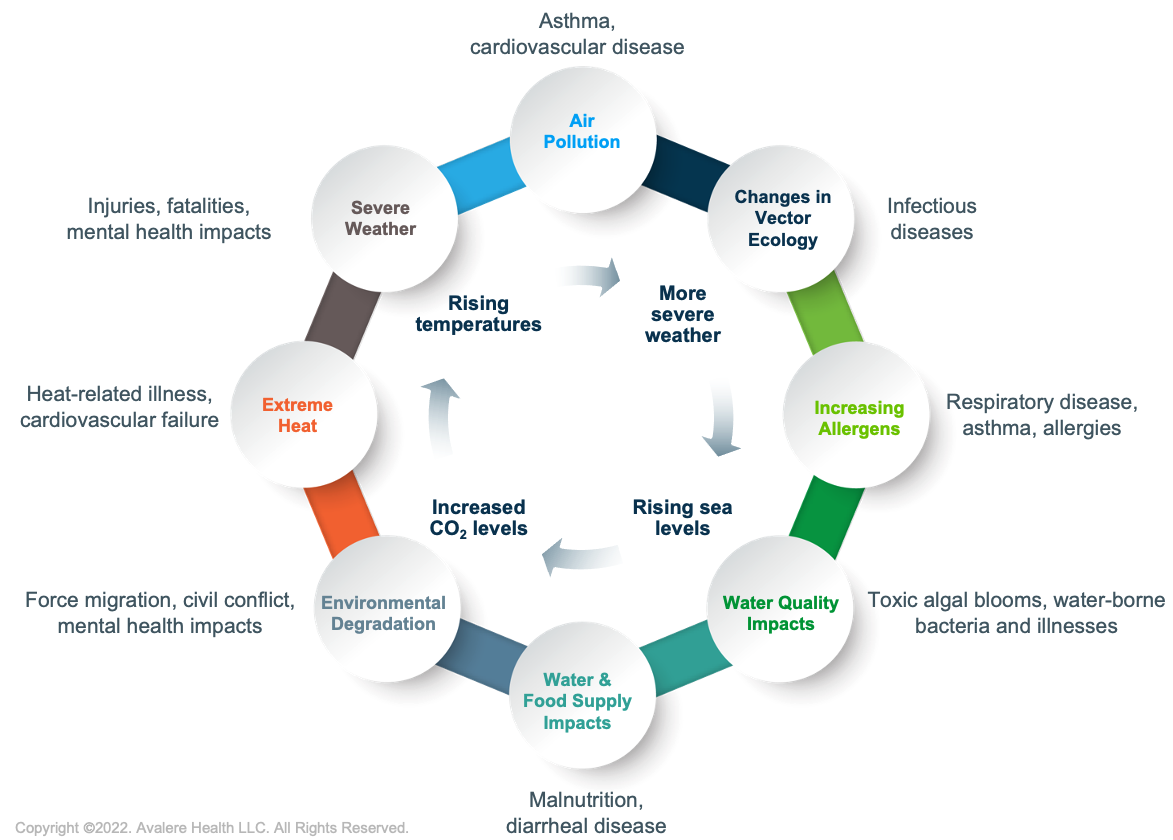Addressing Climate Change Impacts on Health
Summary
As climate change continues to alter the patterns of everyday life, healthcare stakeholders should consider strategies to prevent and mitigate negative environmental contributions and proactively address the impacts of climate change on health outcomes, health equity, and healthcare costs.The Biden administration and federal and state regulators are starting to recognize the health impacts of climate change and to encourage action by healthcare stakeholders. In October 2021, the Biden administration released a national plan to address climate change and in August 2021, Health and Human Services established the Office of Climate Change and Health Equity to protect human health from the effects of climate change, with a particular focus on vulnerable populations. In 2022, regulators are paying increased attention to the issue of climate change as noted by the recent inclusion of requests for comment in the proposed 2023 Notice of Benefit and Payment Parameters.
These efforts are responses to growing evidence of climate-related impacts on human health (see Figure 1). Many experts anticipate climate change will lead to increases in respiratory, cardiovascular, and other chronic diseases, in addition to expected increases in disruption to healthcare infrastructure and systems. Nearly two-thirds of healthcare services in the US are at risk of natural disasters, which are expected to increase in frequency and severity as climate change accelerates. For example:
- During the June 2021 Pacific Northwest heat wave, emergency department (ED) visits for heat-related illnesses were 69 times higher than ED visits in June 2019.
- In February 2021, Texas faced a snowstorm that, at its peak, left 10 million people without power and caused an estimated $130 billion in economic losses.
- In Southeast Texas, 45 of roughly 100 hospitals declared an “internal disaster” status after blackouts and water outages.
The ways in which climate change affect human health vary geographically and often place the greatest burden on vulnerable populations, potentially exacerbating health disparities.

Adapted from CDC National Center for Environmental Health (March 2021)
Recommendations for Stakeholders to Address Climate Change
As climate change continues to alter patterns of everyday life, healthcare stakeholders should consider the following climate-related impacts on their businesses and develop strategies to mitigate these effects:
- Providers and Hospital Systems are vulnerable to extreme weather events and natural disasters that can impair the ability of providers to deliver services and prevent patients from accessing facilities and necessary care. Developing and implementing mitigation and adaptation strategies can help alleviate pressure on the overall healthcare system.
- Health Plans may see increased healthcare utilization and costs of care associated with greater comorbidities and worse health outcomes due to climate change. Stratifying member data by geography and health conditions can help plans to better understand and prepare for the projected future impacts of climate change on member health.
- Manufacturers can improve their sustainability practices by reducing waste, lowering energy consumption, offsetting carbon emissions, and optimizing their supply chain. Further, by studying and establishing clear links between climate change and poor health outcomes among their priority populations, manufacturers can improve awareness, facilitate treatment, and address health inequities for impacted individuals.
Conclusion
The implications of climate change vary by stakeholder group, and many downstream consequences are yet to be quantified. All have the opportunity to be part of the solution. Two early examples of healthcare stakeholders taking action include:
- Collection and stratification of data related to climate and related health outcomes by a Medicaid managed care plan to identify high-risk patients and develop evidence-based adaptation that target vulnerable individuals.
- Development of programs and initiatives towards improving climate resiliency, including solar power purchasing agreements and programs to reduce greenhouse gas emissions.by a large metropolitan medical center.
For more information on how climate change impacts health outcomes and potential strategies for healthcare stakeholders, see our white paper, “Climate Change as a Driver of Health Outcomes.”
To receive Avalere updates and learn how we support clients, connect with us.






